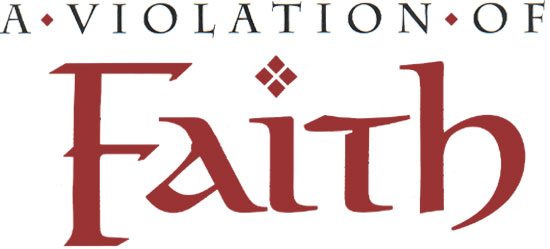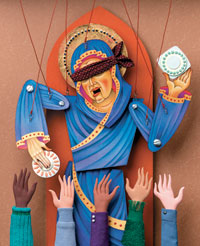A Violation Of Faith
Mark A. Kellner September/October 2002
Getting your Trinity Audio player ready...

By Mark A. Kellner
Illustration By Jeff Dever/Freshart
The continuing battle over California's Women's Contraceptive Equity Act, or WCEA, is not only due to occupy part of that state's supreme court calendar this fall, but also highlights the continuing tensions between the free exercise of religion and government in America's most populous state.

Arguments before the court will reprise several issues raised by WCEA, first passed in 1994 but vetoed three times by then-Governor Pete Wilson before his successor, Governor Gray Davis, signed the measure in 1999. The bill, which took effect in 2000, requires employers in the state who offer workers health insurance to pay for contraception. Catholic Charities of Sacramento, affiliated with the Roman Catholic Church, sued, saying that paying for contraception is against church teachings. The California act exempts certain church-based organizations, but not Catholic health care, educational, or social service operations.
After the bill was signed, Catholic Charities sued the state, seeking an exemption, and was rebuffed by a state appeals court in July 2001. The state supreme court case is an appeal of that decision.
"The autonomy of our church has been attacked and the integrity of our religious beliefs have been ridiculed and belittled by the California legislature as a pretense to allowing the state to regulate the internal policies of Catholic religious institutions," said Michael F. Kiernan, Sacramento diocesan director for Social Service Ministry and executive director of Catholic Charities of Sacramento, the plaintiff in the case, when filing an initial brief in the appeal.
In September of 2001, the state supreme court said it would grant a review of the appellate court decision on all of the issues briefed, both state and federal:
Is the religious guarantee in the California constitution broader than the one found in the U.S. federal Constitution, thus triggering the "strict scrutiny" standard?
Was the law's narrow definition of religious organization gerrymandered, therefore violating both state and federal establishment clauses on the question of "excessive entanglement"?
Did the appeals court erroneously find the WCEA laws to be "neutral and of general applicability," when the Catholic Charities claims "it can be demonstrated that certain Catholic organizations were targeted in violation of the federal free exercise clause"?
And does Catholic Charities qualify for a "hybrid rights" claim, invoked when more than one constitutional right is infringed?
Groups beyond the Catholic Church are looking closely at the case as well as at the issues it raises. Several evangelical churches and related groups—which on their own have no theological issue with contraception—have filed amici briefs because they recognize the larger questions raised in this case.
Those who accept some forms of contraception, but who oppose abortion, for example, could be squeezed by the mandate of this law. Wendy Wright, a senior policy director at Concerned Women for America in Washington, D.C., asserted in an interview, "People who are aware that some of these so-called contraceptives like Depo-Provera, Norplant, IUD—the morning-after pill—are actually abortifacient would possibly have an objection to being forced to carry this."
Wright added, "The state really has no business telling organizations that they have to cover abortifacients."
One supporter of the state's position, American Civil Liberties Union of Northern California attorney Margaret Crosby, sees the matter differently. "Workers should not have their contraceptive decisions made by their employers—unless they are priests," Crosby told the Los Angeles Times in July of 2001. (Crosby's spokeswoman declined repeated requests from this writer for an interview.)
In her amici brief, Crosby stated that the restrictive nature of the religious exemption in WCEA "is not unusual in drawing a line between spiritual and secular aspects of a religious organization."
Crosby, who was credited in the Los Angeles Times report as the author and prime advocate for WCEA, believes there is a difference between "core worship" duties serving a congregation and "secular services" provided to the public.
In short, she holds that because Catholic Charities (among other religious-based social service organizations) offers its assistance to anyone, regardless of creed, and hires workers outside of its faith community, it cannot claim a religious exemption in this case.
Alan Brownstein, a constitutional scholar and law professor at the University of California at Davis, disagrees.
"This isn't a mere policy practice, but [it is] intrinsic to the religious mission, to why the Catholic Church engages in charity. You can't say because your religion's tenets require nondiscriminatory benefits, we have to comply" with WCEA, Professor Brownstein said in an interview.
"In this particular case, we're dealing with contraception. If Catholic Charities loses, the next regulation that interferes with an autonomous religious institution could have a different mandate. There is no shortage of state regulations that could impinge," he added.
"You can't ask a Jewish organization that runs a community meals program to serve ham sandwiches," Brownstein added. "It doesn't matter that it's not hiring clergy; you're asking them to do something that is directly contrary to their core beliefs."
In the Catholic Charities case Brownstein sees the possibility of harm to a wide range of groups. "The problem for minority faiths is that the state isn't generally thinking about the tenets and mandates of groups that don't have a lot of political clout or are on the forefront of the legislature's agenda," he said.
"This punishes charities who are trying to do a good work because they don't toe the line with Planned Parenthood. If you don't pay for something you don't even need, you could be shut out of business," adds Wendy Wright.
At this writing, it is unclear as to how the California Supreme Court will rule in this case. In May 2002 the court supported another Catholic group in its effort to terminate an employee who was proselytizing for his evangelical faith in the workplace during job hours; some view the ruling as strengthening the rights of religion-based employers to maintain an atmosphere supportive of their beliefs.
But if the panel affirms the state position in the WCEA matter, it would allow the state to define what is and isn't religiously exempt activity. The stakes are quite high in this dispute. Alan J. Reinach, of the Seventh-day Adventist Church's Pacific Union, puts it this way: "If the state wins, then religion's wings have been severely clipped, and we're free to talk to ourselves and minister to ourselves, but we have no freedom to serve the public in Christ's name."

______________________
Mark Kellner is a freelance writer living in Marina Del Rey, California. He is a news contributor to Christianity Today and a weekly columnist for the Washington Times.